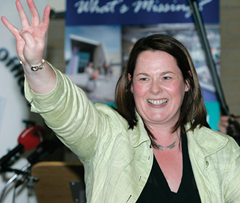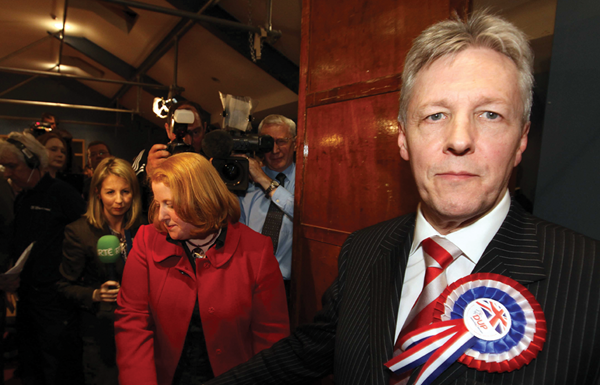All politics is local
agendaNi reviews an election result which saw Northern Ireland keep its ‘semi-detached’ status but also suggested the province’s MPs could have more bargaining power in future.
Northern Ireland declared its independence from mainland British politics on 6 May, as the New Force pact faltered, but the national spotlight fell on the local parties as potential powerbrokers in the days that followed.
Clinching victory from the jaws of defeat, Sinn Féin held its ground after the tensest of waits and narrowest of wins for Michelle Gildernew. Four votes makes for a 0.008 per cent majority and the dreary steeples of Fermanagh and Tyrone, as Churchill once called them, irritated Conservative Central Office by denying them a 307th whipped seat.
Nowhere else was Gildernew’s party seriously challenged; its leading 25.5 per cent share is 3,726 votes ahead of the DUP.
Abstention remains central for Sinn Féin. Gerry Adams’ phrase that “what happens in the other island is for the people there” neatly summed up the principle yet, indirectly, the party’s absence cut the Commons’ winning margin from 326 to 323. Ironically for republicans, this outcome brought the province’s sitting MPs into play in the post-election arithmetic and deal-making.
Seventeen seats short, the Tories could not solely rely on smaller parties. A Liberal-Labour coalition (totalling 315 seats) would have been eight seats shy, giving decisive influence to the Northern Ireland bloc (13 seats), the SNP-Plaid combination (9 seats) and Green newcomer Caroline Lucas. It was not to be, and the Cameron-Clegg alliance starts with a safe 41-seat majority.
Leading the throng, the DUP emerged confident but without a parliamentary leader. If Stormont seats are vacated, the DUP would have separate teams of eight MPs and 36 MLAs.
Peter Robinson was the lightning rod for voter resentment in East Belfast and Naomi Long his surprised and initially overwhelmed successor. “It feels great,” she repeated as cameras and reporters circled her in Newtownards, as she absorbed a sudden and historic moment.
It was only in the last 15 or 20 minutes of the count that Long pulled ahead in the two-horse race with Robinson. His dignified concession speech appeared well-prepared, with the admission that he would have “preferred not to stand … you should always be careful what you wish for in politics.”
David Vance took credit for ending “Robinson rule” by cutting into the DUP vote but his was the only victory in a dismal night for Jim Allister. His poor second place could secure an Assembly seat but the average TUV candidate could usually manage only a thousand or so votes. The party’s post-election silence was telling after weeks of combative press releases.
On the back of a quiet campaign, the Greens tested the water in four seats with an eye to the Assembly poll.
Alliance has often felt sidelined by the media’s focus on the ‘four main parties’ and David Ford was quick to criticise that thinking. He was also hardly gracious in victory to the Ulster Conservatives and Unionists, who competed for much the same voters but to no avail.
Reg Empey’s leadership was therefore in greater doubt than Robinson’s, having formed and led the ambitious but unsuccessful pact. His South Antrim performance was the closest chance to taking a seat, missing out by 1,183 votes.
Cameron’s commitment to the project could not be doubted. Almost a full day of last-minute campaigning was missed when he flew to Belfast.
Disorganisation and slowness – on the UUP’s part – and the Paxman interview comments contributed to the failure. The DUP also contrasted the candidates’ inexperience with their own incumbents.
 The absence of Ulster Unionist MPs is an unprecedented situation; the party still has three peers. This makes a comeback harder but no collapse took place. UCUNF attracted roughly the same vote as its two parties held in 2005, indicating a baseline of around 100,000 moderate unionists.
The absence of Ulster Unionist MPs is an unprecedented situation; the party still has three peers. This makes a comeback harder but no collapse took place. UCUNF attracted roughly the same vote as its two parties held in 2005, indicating a baseline of around 100,000 moderate unionists.
A similar support base exists for the SDLP, whose members took comfort in holding their three seats. South Belfast could have mirrored Fermanagh South Tyrone if a single unionist had stood; the combined DUP-UCUNF poll was 14,010 to McDonnell’s 14,026.
Meanwhile, Sylvia Hermon’s astonishment grew throughout the evening as votes piled high. “What can I say to the people of North Down?” was her unscripted response after ploughing “a lonely furrow”. Walking from the stage towards the TV cameras, she paused, stood still and clasped her two sons – a deeply personal moment.
Unionism, while still in first place, was the statistical loser of the election. A total of 340,620 votes were cast for unionist candidates. However, there were 31,368 fewer unionist votes than five years ago – suggesting a growing problem of ‘garden centre Prods’. Independent unionists, notably Sylvia Hermon and Rodney Connor, garnered 12.9 per cent – or 43,743 votes – and the main parties can therefore expect to reclaim some of these for the Assembly poll.
Attention immediately centred on Fermanagh but the broader trend to watch is the ‘retreat from Belfast’. Failure to retake the south seat was reinforced by the surprise defeat east of the Lagan, leaving Nigel Dodds as the city’s sole unionist MP, just 2,224 votes clear of Gerry Kelly.
The total nationalist vote – at 282,912 – is down nearly 19,000 votes on 2005 with a similar ratio between Sinn Féin and the SDLP. Republican Sinn Féin refuses to contest Westminster elections so dissident support was not registered.
Going forward, unionism is left to search its soul again. Moderate thinkers in that camp were looking forward to normalisation. At some point, elections would involve Conservative, Labour and nationalist runners. However, some commentators want unionism to coalesce around a single party to deter Sinn Féin.
Our sitting MPs are united on the opposition benches for this Parliament and the coalition makes their influence relatively small. The initial stability, however, could be shaken as decisions become more difficult and free votes, together with some Lib Dems opt-outs, could again make Northern Ireland members the main players in Westminster’s new numbers game.






